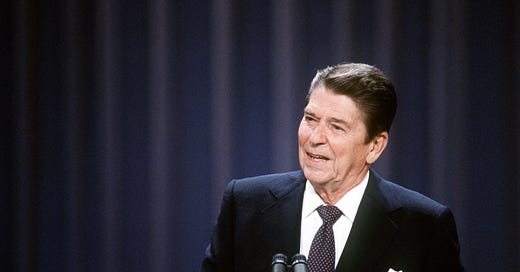Remembering Ronald Reagan
Unwilling to Play for Less Than Total Victory.
by Rod D. Martin
June 6, 2004
It was fashionable for a time to consider Ronald Reagan a warmonger and a fool. Perhaps this is the best indicator of his Chuchillian stature; for like Reagan, Churchill was so maligned, and like Churchill, Reagan saved the world.
The left, of course, credited Gorbachev for this, which resembled nothing so much as crediting Hitler’s suicide for the end of World War II. Reagan’s victory -- and the fact that we are not now speaking Russian or buried ala Khrushchev under a smoldering ruin -- was produced of a vision shared by no president before him, and a fortitude possessed by few.
He refused to accept the left’s received wisdom of “moral equivalence” between the Communist East and the democratic West: he called Russia the “evil empire” it was, and revived the moral courage essential for victory. His opponents, lesser men from Michael Dukakis to Michael Foot, hurled their epithets: "dangerous,” “destabilizing,” “cowboy.” But Reagan understood the real danger was in a nuclear superpower bent on world conquest and in the throes of both economic and ethnic collapses its Western apologists refused to see.
He repaired a nuclear “deterrent” so badly eroded as to lack credibility and invite blackmail. Side by side with Margaret Thatcher, he stood down the left’s greatest-ever attempted appeasement -- the nuclear freeze movement -- and not only rearmed America but re-established the deterrent in Europe. The Soviets, playing off the terror of the times, threatened to walk out of stalled arms talks if he did so. In a move which stunned everyone, he wished them fond farewell. He would not be bullied; and when they realized it, they returned.
His certainty that people everywhere yearned for freedom and that free markets could always out-produce centrally-planned slavery drove his strategies where realpolitik could never go. He replaced both containment and détente with his “Reagan Doctrine,” proclaiming America would actively roll back its foe by helping freedom fighters behind the Iron Curtain. From World War II until Reagan, not one square inch of ground had been recovered once lost to communism. Now all things changed, as Moscow was made to play defense, first in Grenada and Afghanistan, and ultimately from the Berlin Wall to the USSR itself.
Unwilling to play for less than total victory, he went for the Russian jugular. Realizing that over half of all Soviet hard currency came from the export of oil he cut a deal with Saudi Arabia: weapons and other benefits previously unavailable, in exchange for an oil glut which would buoy the West and skewer the common foe. Combining this with an arms race, the keystone of which was the high-tech Strategic Defense Initiative, he pushed Moscow over a cliff his opponents said could not be there. Gorbachev, coming in much too late after a string of dead General Secretaries, was left first to “restructure,” then to dismantle his empire, and finally just to “wither away.”
This is Reagan’s greatest legacy, but it is hardly his only one. His supply-side faith in Laffer’s lower marginal tax rates ignited a twenty-year boom in an America used to every-three-year recessions. His vision for tax-deferred retirement accounts transferred the “means of production” to the “proletariat” and destroyed the basis for class warfare: shareholders, a tiny fraction of the population in 1980, today are a large majority. The wealth his ideas created drove a technological boom unlike any the world had ever seen, and convinced billions previously susceptible to socialism that freedom really works.
It is there that Reagan’s greatness really lies. To a bleak Orwellian world, he restored hope; and the chance not only that there would be a next century, but that it would be a good one.
***
Editor's Note: This op-ed from Rod D. Martin was originally posted at Britain's Freedom Today, and later reprinted at WorldNetDaily and Insight Magazine.




